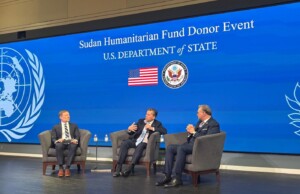Press Act amendments unite journalists in petition
Journalists have embarked on a campaign to collect signatures for their case to protest new amendments to the Press and Publications Act in Sudan. “They were drafted overnight, without the knowledge of the press.”
Journalists have embarked on a campaign to collect signatures for their case to protest new amendments to the Press and Publications Act in Sudan. “They were drafted overnight, without the knowledge of the press.”
Yesterday, journalists collected the first signatures for their protest against the draft amendments to the 2009 Press and Publications Act. The coordinator of the Sudanese network Journalists for Human Rights (JHR) Faisal El Bagir, said that “of all the amendments to the Press Act since 1993, the most recent amendments represent the worst”.
Amendments include the electronic press to limit its freedom and are similar to the restrictions imposed on the traditional press. In addition the powers of the Press Council increased and it may stop journalists and ban them from writing and shut down newspapers indefinitely.
“The press community should organise itself and resist these amendments in every way,” El Bagir told Radio Dabanga.
2009 Press Act
The 2009 Press and Publications Act allows for restrictions on the press in the interests of national security and public order, contains loosely defined provisions related to bans and holds editors-in-chief criminally liable for all content published in their newspapers. The press freedom organisation Freedom House reported that several other laws have been used against the press, including elements of the 1991 penal code, the 2010 National Security Forces Act, and emergency measures that have been enacted in the states of Darfur and Kordofan.
The parliament passed a Freedom of Information Law in January 2015. The legislation, first proposed in 2011, includes 12 categories of exemptions to protect information from public release, including national security and foreign policy matters.
Contradictory
Sudanese lawyer Nabil Adib said that the proposed amendments to the Press and Publications Act will allow a greater restriction on the freedom of press and journalists, such as banning newspapers from publication and banning journalists from writing.
'The powers granted to the Press Council are mouth-sealing and contradict the Sudanese constitution.' – Lawyer Nabil Adib
The amendments have not been presented to the competent authorities, nor have been discussed on a large scale with the aim to present them to the national parliament. “But they were withdrawn and a copy appeared in El Tayyar newspaper,” said Adib.
“The new act has come under the jurisdiction of the courts, the Press and Publications Council and a new committee called the 'Registry Committee'. The powers granted to these parties by the text of the Act are mouth-sealing, and contradict what is in the Sudanese constitution.”
The constitution allows for press to write and for people to have access to the press, while the new Press Act draft amendments allow the Press Council to ban a journalist from writing and a newspaper from publishing indefinitely. The amendments are not finalised, however, and they are surrounded by considerable discussion and disagreement among journalists.
El Bagir: “It is better to present these amendments to the relevant and competent bodies, who are the journalists and legal professionals, as the Parliament alone does not have the technical information necessary to discuss the issue in all respects, especially since it is related to constitutional rights.”
Newspapers disagree
On Sunday, newspaper editors said that the new draft act was orchestrated at night and that it is unfair to journalists in Sudan. “We were surprised by the withdrawal of items and details that were not agreed upon by the formed committee,” a journalist said in a workshop organised by the Sudanese Journalists' Union.
The head of the union, El Sadig El Rizeigi, said that they are surprised the act draft amendments were formulated by bodies he was unable to name, overnight. “The union and the journalists should move to raise a memorandum to the Prime Minister, Bakri Hassan Saleh, including the vision of journalists and these unnamed parties accused of playing a part in formulating the draft changes.”
The editor of the weekly economic Elaf newspaper, Khalid El Tijani El Nur, said that the draft act violates the constitution which includes the Basic Rights document.
Ahmad El Ballal, the editor-in-chief of Akhbar El Youm newspaper, said that the new act “strips what is left of the press – and if the government is the one to do so, we refuse being held accountable”.











 and then
and then